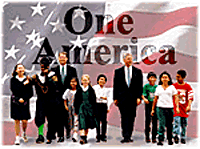 |
 |
Between 1985 and 1990, white supremacist groups in Montana increased their membership and recruiting efforts. In response, several local human rights groups joined forces in 1990 to form the Montana Human Rights Network (MHRN). Its mission is to oppose white supremacist groups by using three types of strategies: research and exposure, community organizing and public policy initiatives.
In many cases, extremist groups have adopted a strategy of presenting themselves as patriotic citizens while also promoting racism and anti-Semitism. To counter this strategy, MHRN engages in extensive work to research these organizations and publicly expose them. MHRN produces a regular publication that includes documentation of these groups, and occasionally issues special reports about them. MHRN was the first group in the country to reveal the links between white supremacist groups and the Militia movement. As a second part of its strategy, MHRN sends organizers to communities where hate groups are active or where hate violence has occurred. These organizers bring people together and assist them in forming coalitions that support victims of bigotry. Following a rash of anti-Semitic and racist hate crimes in Billings, MHRN was instrumental in organizing the community's responses. MHRN also engages in public policy advocacy. In some instances, this involves advocating at local and state levels for the enforcement of civil rights laws; in other cases, the network tries to increase the effectiveness of local enforcement officials in following a law that mandates the reporting of hate crimes to state officials. MHRN's work in the public policy area also presents an opportunity to educate the public and support local organizing efforts.
Outcomes and Significant Accomplishments MHRN has organized twelve local affiliate groups and has more than 1,300 members. This is significant for a large, predominantly white (93%) rural state with a population of less than one million. MHRN and its local affiliates routinely sponsor community events drawing crowds of up to 300 people. MHRN has also worked with law enforcement to provide training regarding the radical right and hate violence. Its work has significantly contributed to several tangible results, including the adoption of the Martin Luther King Holiday in Montana, the enactment of a state statute which requires law enforcement officials to report hate crimes, increased penalties for threatening public officials and a new law making it illegal to maliciously harass other citizens.
|
![]()
To comment on this service,
send feedback to the Web Development Team.
![[White House icon]](/New/images/home_pin.gif)
![[Help Desk icon]](/New/images/help_pin.gif)